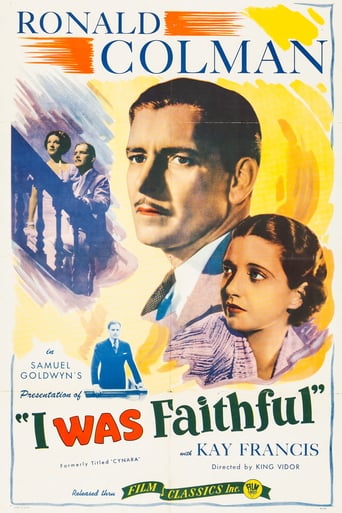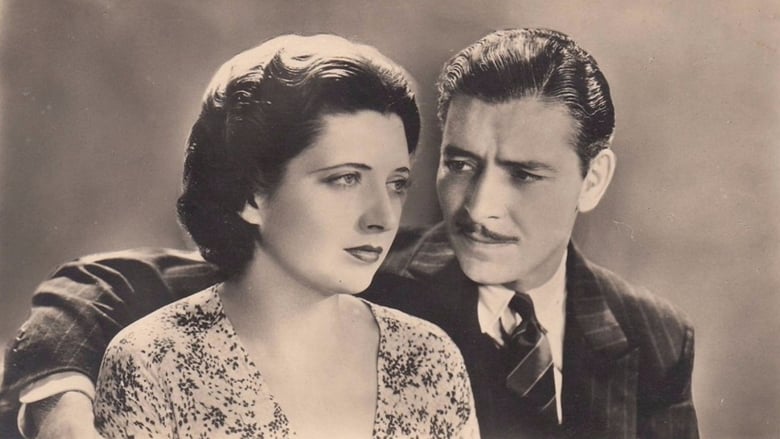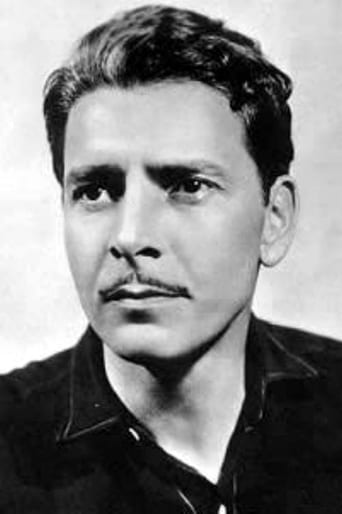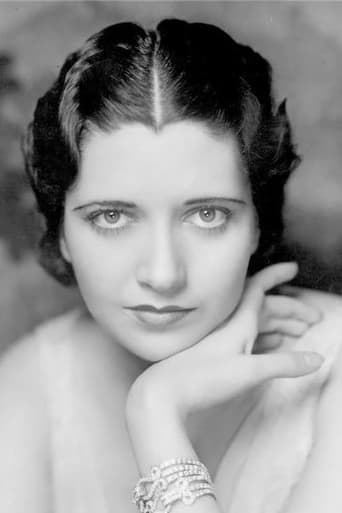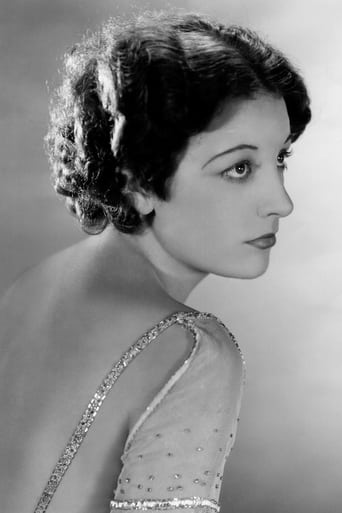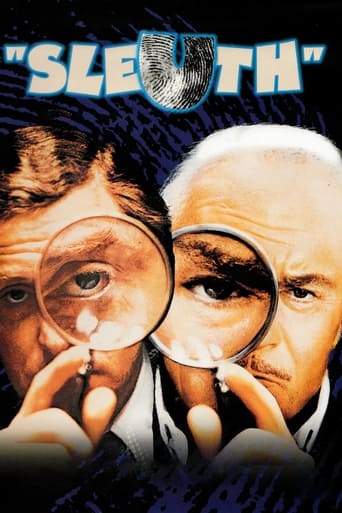Cynara (1932)
A London barrister's marriage is under strain after his affair with a shopgirl who is out to have him. The story is told in flashback.
Watch Trailer
Cast
Similar titles


Reviews
Fantastic!
The film creates a perfect balance between action and depth of basic needs, in the midst of an infertile atmosphere.
One of the worst ways to make a cult movie is to set out to make a cult movie.
This is a dark and sometimes deeply uncomfortable drama
"Women marry men they hope they can change, and men marry women whom they hope will never change". So says the wise, aging scoundrel played by Henry Stephenson, giving a terrific performance in this lavish looking Goldwyn film that features a story similar to Selznick's 1939 classic "Intermezzo", that of a decent man (Ronald Colman) who finds himself involved with another woman while married to a wonderful woman and separated from her. The separation comes because of the wife's (Kay Francis) silly younger sister (Florine McKinney), escorting her to Italy on a whim on the day before Colman and Francis's seventh anniversary. Stephenson takes Colman out to dinner where they meet two young women (Phyllis Barry and Viva Tattersall) and spend a night out on the town with them. Barry falls head over heels in love with Colman who warns her about his situation, but she cannot allow herself to go. Unlike Ingrid Bergman in "Intermezzo", Barry is emotionally immature, even if she's not an outwardly silly creature like McKinney, and the story indicates that nothing inappropriate occurs during the times Colman and Barry are together.As he would do in his string of independent films of the 1930's, Samuel Goldwyn (along with director King Vidor and their artistic team) creates a very lavish fantasy like setting, with sensational glamorous restaurants, beautiful parks with lush greenery and art decco houses and other locales. From the reviews I've read, this has been referred to as being greatly dated, but the only thing I find perhaps dated about it is the fact that all three people involved in the situation are incredibly nice, although Barry's final act shows her to be an already troubled girl who needed more maturing before entering into any kind of serious relationship regardless of the other person's marital status. Francis gives her usual professional performance, noble yet not long-suffering, understanding yet not shocked when the revelations come out. Stephenson's character reminds me of the lovable old coots that Charles Coburn would later become famous for, and he steals every scene he is in with wit, wisdom and a touch of an "I've been there, done that...several times" attitude. As for Barry, she instills her young character with a love of life in the zest of youth that is hiding an inner sadness, indicating that past affairs have not been fulfilling and that she's either doomed to end up alone...or simply just doomed. A surprising climax has the previously vivacious Tattersall confronting Colman over an acting towards Barry, showing a great loyalty and moral code that you didn't expect to come from her. While looking at gossip column reports on affairs today, this might seem a bit unrealistic, but this is a view of a different kind of affair, one where the outcome is about companionship and the avoidance of loneliness rather than one of strictly sexual pleasure. Today's audiences might laugh at such an operatic view of old school scandals, but there are many lessons here to be learned, from the art of personal grace to the meaning of what true love really is, and ultimately, what keeps a marriage together even beyond the worst of situations.
Ronald Colman may never have been better than as the happily married barrister who foolishly embarks on an extramarital affair with a young shopgirl, (Phyllis Barry), in King Vidor's now totally forgotten "Cynara". Made pre-Hays Code this is one of Vidor's best and certainly least known films that treats the subject of adultery with surprising frankness as well as a considerable degree of tenderness. Excellent work, too, from that very fine and underrated actress Kay Francis as the wronged wife and Henry Stephenson as Colman's older friend who is largely responsible for driving Colman into the younger woman's arms. Seek this one out.
The foundation of this film is really understood in the segment where Ronald Colman judges a beauty/swimming competition. As the organizer keeps saying to him -- there will be no class distinctions here today! And that's what this film is about -- an affair between a well known barrister and a common girl, and the disgrace it brings to the barrister. Without understanding that, you'll wonder what all the fuss was about.In Naples, the disgraced London barrister (Ronald Colman) is about to divorce his beloved wife Clemency (Kay Francis) and start anew in South Africa. But before parting she asks him to explain how the affair happened, which is done through a long flashback: When Francis goes to Venice with her sister, Colman meets a "shop girl" and has an affair. It appears that it is not platonic, and after all, this is 1932 England. Unfortunately, the woman he falls for is rather emotionally needy, and when the affair ends, she commits suicide. While Colman cannot be held legally responsible, at the inquest he is held morally responsible. After Colman and Francis separate, his friend who knew of the affair (and actually encouraged it), convinces Francis to think about what it would mean to her to never see him again...hinting at suicide. Francis surprises Colman by showing up on the boat to South Africa.This is a very "old" film...what I mean by that is that this is definitely 1932. Today's audience would find this a bit stodgy. However, it is one of Ronald Colman's great successes, and he is wonderful here. I often enjoy Kay Francis, but she seemed a bit stiff here...although maybe she's supposed to be; nevertheless, I would not find this one of her great film roles. Henry Stephenson plays the elder barrister who encourages the affair, and it is through him that we see the attitude toward class; although not a very sympathetic role, I always delight in his screen appearances.For buffs of old films, or fans of Ronald Colman (like me), I recommend this film.The flashback ends. After Jim leaves to board his ocean liner, Tring comes to talk to Clemency. While he accepts a share of the blame for what happened, he reminds Clemency that she may never see her husband again. She rushes to the ship to accompany Jim.
King Vidor directed "Cynara," an early talkie starring Ronald Colman and Kay Francis, in 1932. The title is based on a poem by Ernest Dowson that contains the line: "I have been faithful to thee, Cynara, in my fashion." Colman plays a barrister who is faithful to his wife of 7 years, Clemency (Francis) but succumbs to the carnal temptation of a young girl (Phyllis Barry) while his wife and her sister are in Venice.As others commented, there are some lovely effects, including the film within a film, and a piece of paper that Colman rips up that dissolves into flying pigeons in Venice. And there are very good performances by Colman, Francis and Barry, who has the difficult role of the young girl who, because of a mistake, is not considered quite respectable, and falls for Colman.The problem I have with the story is that the Colman character is such a devoted husband in the beginning and so happy about being married 7 years. In practically the next scene, with the encouragement of his friend (Henry Stevenson) he has taken up with this girl. If some of that had been left out of the script, it would have been much more believable.At any rate, well worth seeing for the director, the precode aspects, and the stars.
